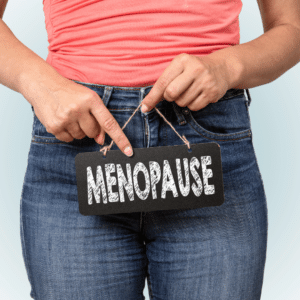Menopause is a natural phase in a woman’s life that brings about significant hormonal changes and a range of symptoms. From hot flashes and night sweats to mood swings and sleep disturbances, navigating through menopause can be a challenging experience. However, there is a therapeutic ally that holds promise in alleviating these discomforts: massage therapy. Beyond its well-known relaxation benefits, massage offers specific techniques that target menopause symptoms, promoting hormone balance, stress reduction, and overall well-being. In this blog, we explore the powerful potential of massage therapy as a natural and effective approachfor relieving menopause symptoms and enhance the quality of life during this transitional period.
flashes and night sweats to mood swings and sleep disturbances, navigating through menopause can be a challenging experience. However, there is a therapeutic ally that holds promise in alleviating these discomforts: massage therapy. Beyond its well-known relaxation benefits, massage offers specific techniques that target menopause symptoms, promoting hormone balance, stress reduction, and overall well-being. In this blog, we explore the powerful potential of massage therapy as a natural and effective approachfor relieving menopause symptoms and enhance the quality of life during this transitional period.
Understanding Menopause: A Comprehensive Guide
Menopause is a natural biological process that marks the end of a woman’s reproductive years. It is defined as the absence of menstrual periods for 12 consecutive months, indicating the conclusion of fertility. Typically occurring between the ages of 45 and 55, menopause is a significant milestone in a woman’s life. However, the transition into menopause, known as perimenopause, can start several years earlier.
During perimenopause, which can last anywhere from a few months to several years, a woman’s hormone production begins to fluctuate. This hormonal shift is primarily characterized by a decline in estrogen and progesterone levels, which are responsible for regulating the menstrual cycle and supporting reproductive functions. These fluctuations can lead to various physical and emotional changes, often accompanied by a range of symptoms.
While menopause is a natural process, certain factors can influence its timing. Genetics, family history, and certain medical treatments or procedures, such as hysterectomy or chemotherapy, can contribute to an earlier onset of menopause. Additionally, lifestyle factors, such as smoking and certain chronic health problems, may impact the age at which menopause occurs.
It’s important to note that menopause affects each woman differently. The duration and severity of symptoms can vary significantly from person to person. Some women may experience mild symptoms that do not significantly impact their daily lives, while others may face more intense and disruptive challenges during this transitional phase.
Hormonal Changes in Menopause and Their Impact
During menopause, the decline in ovarian hormone production, particularly estrogen and progesterone, can have a profound impact on various aspects of a woman’s health. These hormones play crucial roles in the body beyond reproductive functions, influencing bone density, cardiovascular health, cancer protection, and central nervous system functions.
1. Bone Density: Estrogen plays a crucial role in maintaining bone density and strength. As menopause progresses and estrogen levels decline, women become more vulnerable to bone loss and conditions like osteoporosis. Decreased bone density increases the risk of fractures and can compromise overall skeletal health, making it essential to address this concern during menopause.
A bone density test, such as dual-energy X-ray absorptiometry (DXA) scans, can assess the health of your bones and identify potential signs of osteoporosis or bone loss. These tests help in monitoring bone density changes over time and guide appropriate interventions to maintain skeletal health.
2. Cardiovascular Health: Estrogen also has a protective effect on the cardiovascular system. It helps maintain healthy blood vessel function and regulates cholesterol levels. With the decline in estrogen during menopause, the risk of cardiovascular diseases, such as heart disease and stroke, can increase.
3. Protection Against Cancer: Estrogen plays a role in protecting against certain types of cancer, such as ovarian and breast cancer. As estrogen levels decrease, the risk of developing these cancers may increase. However, the relationship between hormones and cancer is complex, and more research is needed to fully understand the mechanisms involved.
4. Central Nervous System Functions: Estrogen affects various functions of the central nervous system, including cognition, mood regulation, and memory. Some women may experience cognitive changes and mood swings during menopause due to hormonal fluctuations. [Here’s an interesting article about the link between Alzheimers and Estrogen]
Understanding these hormonal changes and their impact on the body provides valuable insight into the challenges women may face during menopause. However, there is hope in effectively managing these changes and mitigating associated symptoms.
Common Symptoms of Menopause and Their Impact
Menopause brings about a variety of symptoms that can significantly impact a woman’s physical and emotional well-being. While the experience may vary from person to person, there are several common symptoms associated with menopause:
 1. Hot Flashes and Night Sweats: Hot flashes are sudden, intense feelings of heat that spread throughout the body, often accompanied by sweating and a rapid heartbeat. Night sweats refer to excessive sweating during sleep, leading to disrupted sleep patterns and fatigue. [More ways to help night sweats]
1. Hot Flashes and Night Sweats: Hot flashes are sudden, intense feelings of heat that spread throughout the body, often accompanied by sweating and a rapid heartbeat. Night sweats refer to excessive sweating during sleep, leading to disrupted sleep patterns and fatigue. [More ways to help night sweats]
2. Mood Swings and Emotional Changes: Hormonal fluctuations during menopause can lead to mood swings, irritability, anxiety, and feelings of sadness or depression. These emotional changes can affect daily functioning and quality of life.
3. Sleep Disturbances: Many women experience difficulty falling asleep or staying asleep during menopause. Night sweats and hormonal fluctuations can disrupt sleep patterns, leading to fatigue, daytime sleepiness, and reduced overall well-being.
4. Vaginal Dryness and Discomfort: Declining estrogen levels can cause vaginal dryness, itching, and discomfort during sexual intercourse. These changes may impact a woman’s sexual health and intimate relationships.
5. Reduced Libido: Fluctuating hormone levels can contribute to a decrease in sexual desire and overall libido, affecting a woman’s sexual satisfaction and quality of life.
6. Cognitive Changes: Some women may experience memory lapses, difficulty concentrating, and cognitive changes during menopause. These changes can impact work performance and overall cognitive functioning.
7. Changes in Weight and Body Composition: Hormonal changes during menopause can contribute to weight gain, particularly around the abdomen. Slower metabolism and decreased muscle mass can make weight management more challenging.
8. Urinary incontinence: As estrogen levels decline, the pelvic floor muscles, which support the bladder and urethra, can weaken. This weakening can lead to various forms of urinary incontinence, including stress incontinence and urge incontinence. Stress incontinence involves leakage of urine during activities such as coughing, sneezing, or exercising, while urge incontinence is characterized by a sudden and strong urge to urinate, often resulting in involuntary leakage. These urinary symptoms can be distressing and impact a woman’s quality of life. However, there are treatments available, including healthy lifestyle modifications, pelvic floor exercises, and in some cases, medical interventions, that can help manage and alleviate this menopausal symptom.
These symptoms can vary in intensity and duration, and they can have a significant impact on a woman’s physical and emotional well-being. However, it’s important to remember that menopause is a natural phase of life and not a medical condition.
Different Treatments Available for Relieving Menopause Symptoms
Menopause is a unique experience for every woman, and the treatment options for managing menopause symptoms can vary based on individual needs and preferences. Here are some of the different treatments available:
1. Hormone Replacement Therapy (HRT): Hormone replacement therapy involves taking medications that contain hormones, such as estrogen and progesterone, to supplement the declining hormone levels during menopause. HRT can effectively alleviate symptoms like hot flashes, night sweats, and vaginal dryness. However, it is not suitable for everyone and may carry certain risks, so it’s important to consult with a healthcare provider to determine if it is the right option for you.
2. Non-Hormonal Medications: There are non-hormonal medications, such as selective serotonin reuptake inhibitors (SSRIs) and serotonin-norepinephrine reuptake inhibitors (SNRIs), that can help manage symptoms like hot flashes, mood swings, and sleep disturbances. These medications work by affecting neurotransmitters in the brain and may be a viable option for women who cannot or choose not to use hormone therapy.
3. Lifestyle Changes: Making certain lifestyle modifications can have a positive impact on menopause symptoms. Regular exercise, a balanced diet rich in fruits, vegetables, and whole grains, and maintaining a healthy weight can help manage symptoms like weight gain, mood changes, and bone health. Additionally, avoiding triggers like caffeine, alcohol, and spicy foods may help reduce hot flashes.
4. Complementary and Alternative Therapies: Several complementary and alternative treatments are often considered for managing menopause symptoms. These may include herbal supplements (e.g., black cohosh, red clover, evening primrose oil), acupuncture, yoga, meditation, deep breathing and relaxation techniques. While some women report relief from these therapies, it’s important to discuss their use with a healthcare provider and ensure these natural remedies are safe and suitable for individual circumstances.
5. Massage Therapy: Massage therapy is gaining recognition as a beneficial treatment for menopause symptoms. The gentle manipulation of muscles and tissues can help reduce muscle tension, promote relaxation, and alleviate other menopausal symptoms like hot flashes, sleep disturbances, and mood changes. Massage therapy offers a natural and holistic approach to managing menopause symptoms and improving overall well-being and mental health.
It’s essential to consult with a healthcare provider or menopause specialist to discuss the various treatment options available and determine the most suitable approach for managing your specific symptoms. They can provide personalized guidance, considering factors such as your overall health, medical history, and individual preferences. Remember, what works for one person may not work for another, so finding the right treatment approach may involve some trial and error.
Empowering Self-Care: Incorporating Massage into Your Menopause Routine
Menopause is a transformative phase that can bring about various physical and emotional challenges. As women navigate through this journey, self-care becomes crucial in promoting overall well-being and managing menopause symptoms effectively. One powerful and holistic self-care approach to consider is incorporating massage therapy into your menopause routine. Let’s explore how exactly massage can help during this stage of life:
1. Stress Management and Relaxation: Menopause often brings increased stress levels due to hormonal changes and the challenges that accompany this life transition. Massage therapy provides a calming and nurturing environment, allowing you to relax both physically and mentally. The soothing touch and gentle strokes during a massage can trigger the release of endorphins, promoting a sense of relaxation and reducing stress.
that accompany this life transition. Massage therapy provides a calming and nurturing environment, allowing you to relax both physically and mentally. The soothing touch and gentle strokes during a massage can trigger the release of endorphins, promoting a sense of relaxation and reducing stress.
2. Treating Hot Flashes and Night Sweats: Hot flashes and night sweats are common menopause symptoms that can disrupt sleep and daily activities. Massage therapy helps regulate body temperature by improving blood circulation and reducing muscle tension. By targeting specific areas prone to heat sensations, such as the neck, shoulders, and back, massage can provide relief and help minimize the intensity and frequency of hot flashes and night sweats.
3. Hormone Balance and Mood Enhancement: Fluctuating hormones during menopause can contribute to mood changes, irritability, and feelings of anxiety or depression. Massage therapy can support hormone balance by stimulating the release of serotonin and dopamine—neurotransmitters associated with mood regulation and well-being. Regular massage sessions can help stabilize emotions, enhance low mood, and promote a more positive outlook during your menopausal transition.
4. Improved Sleep Quality: Sleep disturbances are a common complaint during menopause. Massage therapy promotes relaxation, reduces muscle tension, and releases physical and mental stress, all of which contribute to better sleep quality. By incorporating regular massage sessions into your routine, you can enhance your sleep patterns, reduce nighttime awakenings, and wake up feeling more refreshed and rejuvenated.
5. Enhanced Physical Comfort and Pain Relief: Menopause can bring about physical discomfort, including muscle aches, joint pain, and tension headaches. Massage therapy addresses these concerns by easing muscle tension, improving circulation, and releasing tightness in the body. Through skilled manipulation of soft tissues, massage can help alleviate physical discomfort, reduce pain, and enhance overall physical comfort during menopause.
6. Self-Care and Self-Connection: Menopause is a time of transition and self-discovery. Incorporating regular massage into your menopause routine creates dedicated time for self-care and self-connection. It allows you to prioritize your well-being, nurture yourself, and cultivate a deeper mind-body connection. Massage therapy provides a space for self-reflection, relaxation, and self-empowerment during this transformative phase.
By integrating massage therapy into your menopause routine, you can embrace a holistic and nurturing approach to self-care. Whether it’s through stress reduction, relief from menopause symptoms, improved sleep, enhanced mood, or physical comfort, massage offers numerous benefits that support your well-being and empower you during this transformative time. Consult with a licensed massage therapist to discuss your specific needs and explore the best massage techniques and approaches tailored to your menopause journey. Book a time with one of our therapists at Body Ache Escape here or call 614-604-6358!



